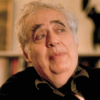Harold Bloom

Harold Bloom
Harold Bloomis an American literary critic and Sterling Professor of Humanities at Yale University. Since the publication of his first book in 1959, Bloom has written more than 20 books of literary criticism, several books discussing religion, and a novel. He has edited hundreds of anthologies concerning numerous literary and philosophical figures for the Chelsea House publishing firm. Bloom's books have been translated into more than 40 languages...
NationalityAmerican
ProfessionTeacher
Date of Birth11 July 1930
CountryUnited States of America
He is a great artist. He may be the finest artist among American writers since William Faulkner and Henry James. There's the endless variety of modes he works in. His style, his stance, his point of view.
The art and passion of reading well and deeply is waning, but [Jane] Austen still inspires people to become fanatical readers.
Indeed the three prophecies about the death of individual art are, in their different ways, those of Hegel, Marx, and Freud. I don't see any way of getting beyond those prophecies.
Reading the very best writers—let us say Homer, Dante, Shakespeare, Tolstoy—is not going to make us better citizens. Art is perfectly useless, according to the sublime Oscar Wilde, who was right about everything. He also told us that all bad poetry is sincere. Had I the power to do so, I would command that these words be engraved above every gate at every university, so that each student might ponder the splendor of the insight.
If they wish to alleviate the sufferings of the exploited classes, let them live up to their pretensions, let them abandon the academy and go out there and work politically and economically and in a humanitarian spirit.
What we call a poem is mostly what is not there on the page. The strength of any poem is the poems that it has managed to exclude.
If I were to sum up the negative reactions to my work, I think there are two primary causes: one is that if there is discourse about anxiety it is necessarily going to induce anxiety. It will represent a return of the repressed for a great many people.
I saw the Oxford English Dictionary there for the first time.
I think that's not reading because there's nothing there to be read,
I realized early on that the academy and the literary world alike -- and I don't think there really is a distinction between the two -- are always dominated by fools, knaves, charlatans and bureaucrats. And that being the case, any human being, male or female, of whatever status, who has a voice of her or his own, is not going to be liked.
I'm talking in the millions. I can't tell you one, two, three or 10. I'm just saying that it's in the millions.
I have never believed that the critic is the rival of the poet, but I do believe that criticism is a genre of literature or it does not exist.
It is hard to go on living without some hope of encountering the extraordinary.
To read in the service of any ideology is not, in my judgment, to read at all,